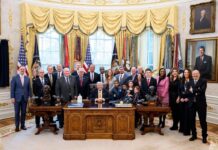COLUMBUS – Economic imbalances of two of the world’s major players – the United States and China – could shake things up in the global market, but Congress’ protectionist stance against China to right the economic problems of both countries is not the solution, said one economist.
Huge trader. Ian Sheldon, an Ohio State University international trade economist in the College of Food, Agricultural, and Environmental Sciences, said Congress has been discussing imposing import tariffs on Chinese goods aimed at reducing the U.S. bilateral trade deficit with China, which currently accounts for 30 percent of the overall $800 billion U.S. trade deficit.
“There has been quite a bit of noise in Congress the last couple of years about China’s economic position in the world,” said Sheldon.
China is quickly becoming the third largest economy in the world and the second largest trading country in the world. China’s gross domestic product has been growing an average of 10 percent every year since 1978, which is large for a developing country, Sheldon said.
“In recent years, many politicians believe that China has been partly able to achieve this because it is violating International Monetary Fund policies by deliberately undervaluing its currency. But trade barriers to solve this issue are not a good idea.”
Tariffs hurt. Sheldon argues that imposing import tariffs will only hurt the U.S. economy and could even send the country into a recession.
“Protection through Congress against China is a foolish way of solving a complex problem,” said Sheldon. “All that protectionism would achieve is to generate inflation in the United States, which would likely mean a rise in interest rates, with the potential for recession.”
He says the adjustment to China’s economy should be made through broader U.S. and Chinese macroeconomic policies.
Such policies include the appreciation of China’s currency and the rebalancing of its economic growth from one based on exports and investment to one based on consumer consumption.
Currency. For several years, China has been managing its currency, and as a result has had little flexibility to use interest rates to control inflation.
“While there is considerable concern within China that liberalizing the exchange rate and allowing the yuan to appreciate could hurt the Chinese economy,” said Sheldon, “the Chinese government, however, does recognize the need for exchange rate reform.
“It is in China’s best interest to let their currency appreciate and move to more flexible monetary policies. That will help in reducing the extent of global market imbalances and also ensure China’s continued economic growth.”
Get 4 Weeks of Farm and Dairy Home Delivered









